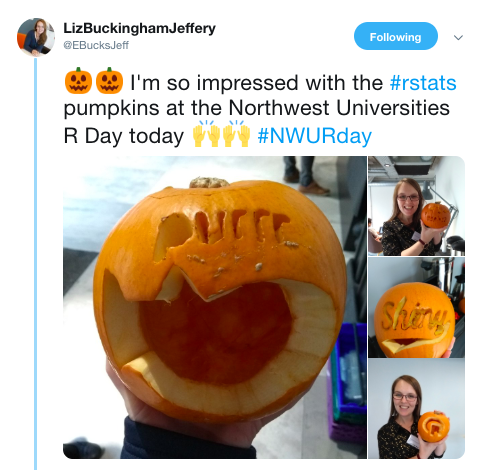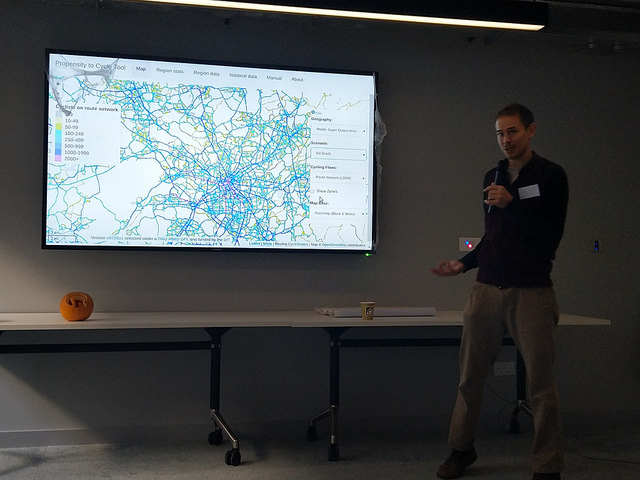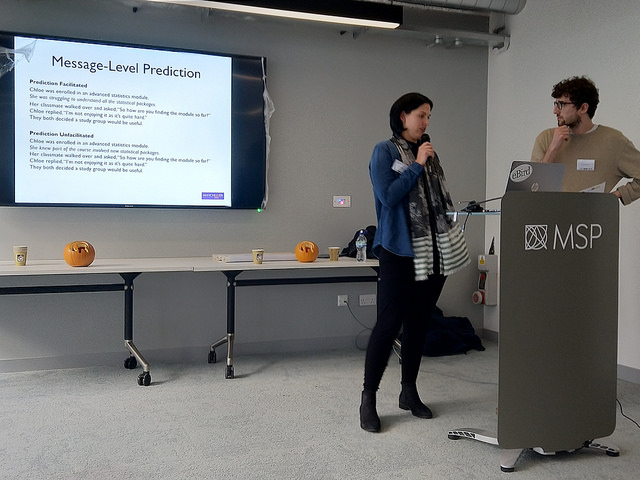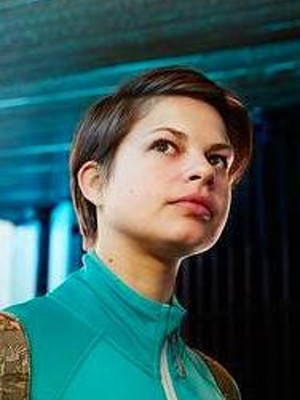Northwest Universities R Day event
Posted on 23 January 2019
Northwest Universities R Day event
 Organising team minus Raniere Silva.
Organising team minus Raniere Silva.Image by Raniere Silva.
By Reka Solymosi, University of Manchester.
In October 2018 I was part of a team who organised the first ever (UK) North West Universities R Day. The team consisted of Christian Devenish, Sam Langton, Oliver Metcalf, Ed Harris, Raniere Silva, Sami Karamalla Gaiballa and myself. Inspired by the series of events organised by the R user groups based at the University of Manchester (UoM) and Manchester Metropolitan University (MMU), we decided to host a one day conference to bring people together around the topic of using R.
There is a great community of support around the use of R. Just search #rstats on Twitter to get a feeling for this. I have found that software user groups, like R user groups, allow people who might otherwise be working in isolation to connect. For example, in my department I am one of two R users among staff, whereas in the university I am one of hundreds, possibly thousands. By tapping into this network I can meet people who might be working on very different topics, but face some very familiar issues. I often feel like I have more in common with someone researching instances of outbreak of norovirus than other crime researchers. User groups are a great way to find these people and break out of the traditional disciplinary boundaries.
 Attendees mingling over coffee.
Attendees mingling over coffee.So to celebrate this community, and bring even more people together, we ran the North West Universities R Day. Our hope to draw people from across various disciplines, as well as different levels was realised; we had attendees from undergraduate students through to Professors and from various different universities across the (UK) North West (UoM and MMU, but also Salford, Liverpool John Moores, Nottingham, Nottingham Trent, Leeds, Leeds Beckett, Sheffield, Stirling, Bristol and York) as well as non-university organisations like Mango, NHS, NSPCC, Centre for Early Child Development and Manchester City Council.
The day consisted of two keynote talks, nine flash talks, five parallel workshops, and a final debriefing, followed by an optional pub quiz. But before I go onto this, I need to mention the *amazing* halloween decorations that were the R-theme pumpkins carved by Raniere. They were a hit, as you can see from their appearance on Twitter.


The first keynote speaker was Robin Lovelace, who presented about Geocomputation with R, and talked about the impact of free software on geodata. His slides are available here. I particularly enjoyed the discussion around the ability to create implementable outcomes, research with an impact, and how data availability and rapid code developments make this a very exciting time to be doing geospatial research in R. I also enjoyed the demonstration of his propensity to cycle tool, which is used by policymakers to help them understand and make use of data.
 Robin Lovelace
Robin LovelaceThe second keynote was by Andy Field, who is a bit of a rockstar in the area of teaching statistics to social science students using R. I may be a bit biased, as I made copious use of his website statistics hell (now called discovering statistics, and no longer flaunting a geocities cool style) when I started teaching, but I have to say that our feedback responses seemed to agree with me. In response to our question about “what did you enjoy most”, quite a few respondents mentioned him by name, with one commenting: “Andy Field’s talk. I bought his book after listening to his talk”. Celeb. His talk was about the lessons learned from using R in teaching. In particular, he developed a package called adventr, which contains a series of interactive tutorials that teach R alongside chapters of his 2016 textbook An Adventure in Statistics: the reality enigma. He talked about the challenges he faced implementing this in teaching, and collated some lessons learned that can be beneficial for all of us teaching stats in R.
 Andy Field
Andy FieldBoth keynotes were very well received. Our post event feedback highlighted both speakers, and many commented on how they were interesting to the diverse cross-disciplinary audience present.
Besides the keynotes there were also flash talks, which were four-minute lightning-speed presentations about any topic using R. The topics were incredibly varied, covering R package development (e.g. insight into the process (and community help) through development of rnaturalearth by Andy South, or package for querying US crime data through crimedata by Matt Ashby), #tidytuesday by Liz Buckingham-Jefferey, text analysis for linguistics by Duygu Candarli, meta-analytic structural equation models by Angel Salazar, text scraping by Fraser Baker, eye-tracking to analyse message comprehension by Elizabeth Le-Luan and Duncan Bradley, different approaches to spatial data visualisation by myself and Sam Langton, and finally visualising audio from bird calls by Oliver Metcalf.




At lunch time, people got to vote with stickers as to their favourite flash talk, to help the speakers win fabulous, R-book-themed prizes. First prize went to #tidytuesday by Liz Buckingham-Jefferey, second to different approaches to spatial data visualisation by myself and Sam Langton, and third to visualising audio from bird calls by Oliver Metcalf.
 Flash talk winners
Flash talk winnersAfter lunch we had a panel discussion around future directions of R between members of academia and industry. We had our two keynote speakers, Robin and Andy, but also Chris Campbell from Mango Solutions, and Tanja Kecojevic founder of Data Teka and involved with #rladies initiatives internationally. Interesting themes emerged from the discussion, and from the audience questions in particular the question of sustainability was raised. Tanja mentioned the importance of the community around R that meant there was lots of effort in maintenance, development, and education, which contribute to R’s longevity. But as a counterpoint, Chris from Mango argued that it may fade out, bringing a business perspective. Counter-counter point as raised by Robin who mentioned that R has been around for a long time already, and there is still legacy code which runs and functions today. It was an interesting debate to witness.
Additionally the impact of R was another topic, and one of the comments, from Andy stood out to me:R enables people to engage with more diverse range of analysis. For example in social science, there is an increase of people grappling with Bayesian statistics (social science methods training is usually all frequentist), and R allows this to be more accessible. I drew parallels in my mind with access to GIS and spatial analysis for non-geographers.
And of course, little R inside jokes permeated, for example the “big debate” in R being whether to use a “=” or “<-” when assigning values to objects. Which reminded me of this exchange between David Robinson of DataCamp fame and the NYPD 111th Precinct twitter account:

Then we had five parallel workshops in breakout rooms, which people could choose and sign up to whatever best fit their interests. In some of the feedback we received people highlighted that it was a difficult choice, as they were all really interesting.
“...fabulous option of workshops. Maybe too many - it was hard to choose!”
Workshops were lead by volunteer instructors Tanja Kecojevic, David Mawdsley, Anna Krystalli, Ralf Becker, and Chris Campbell. I list here the workshops and who led them, with links to the workshop materials, generously provided by the instructors:
1. Tatjana Kecojevic - Build your website using R, RStudio and blowdown package
2. David Mawdsley - A brief introduction to the Tidyverse (Manipulating tabular data, plotting it and combining commands to make analysis pipelines)
3. Anna Krystalli – Reproducible research in R with rrtools
5. Chris Campbell – The curse of the unspecified data definition (Using R in a business environment)
Overall great range of workshops, with something for every level and interest. Do check out the materials linked above, and get in touch with the workshop leaders for any questions.
 Our fantastic workshop instructors.
Our fantastic workshop instructors.
Finally we ended the day with a pub quiz. Sponsored by Mango Solutions, we had some drinks to get the groups thinking, which was required as some of the questions were quite challenging! A list of the pub quiz questions and answers can be found on GitHub.
 Pub quiz winners
Pub quiz winnersOverall it was a great day. People were enthusiastic, and it was just amazing that all this came together as such a grassroots event, by and for the community, and inspiring others. At this point it’s also important to say thank you to our sponsors who made this day possible: The Software Sustainability Institute, R Consortium, Manchester Science Partnership, Mango Solutions, University of Manchester, and Manchester Metropolitan University. Without their support such a day could not have happened. It was fantastic to have the Software Sustainability Institute and R Consortium to support the event through funding, Mango to support the pub quiz with funds, MSP to provide an amazing venue, and MMU and UoM to provide time to organise.
Of course, as organisers we would say the event was so great, but to find out what our attendees thought, we sent around a feedback questionnaire, to see what people enjoyed the most, and what could be improved.
To the question what was most enjoyable, people listed the talks, the workshops, the panel, the enthusiasm of the community, learning about different applications of R. In what to improve, people wanted more time for both the workshops – in terms of having two workshop time slots, so they can attend more than one, and more time for flash talks: “I thought the flash talks were a bit too short and some more detail would have been good”. Some venue issues for example about how the venue allowed networking, or wifi, or one of the breakout rooms not setup with desks. Many comments were about refreshments, or providing transport, which we put away as blue skies thinking for the ideal event, but one comment was about the accessibility to beginners in R. The comment reads:
“The R day was more advanced than I expected. It would have been really nice if one of the workshops was beginners R. I did feel a bit lost at times.”
We hoped to reach out to all levels, and some comments reflected this:
“... it was very inclusive - I knew nothing about R, and yet I didn't feel like an idiot, I learned a lot, and I could engage with all of the talks to a greater or lesser extent…” and “[I most enjoyed] the friendly approach towards users that were not familiar with the use of R.”
Next time, we need to make sure to be more thorough with this. Many other comments were counterbalanced by other comments. For example, one commenter said “The panel discussion wasn't very useful.” but then another commenter said the panel was what they most enjoyed from the day.
Overall the feedback will be taken on board, and we are hopeful that this event was a start of something possibly recurring. There is already talk of NWURday 2019 to be hosted at Sheffield, so watch this space. And rightly so, as feedback was overwhelmingly positive, below I include my favourite quote:
“[I most enjoyed] learning about different applications of R, and the sheer variety of great speakers! Couldn't quite believe the quality of content, all in one place - wow! Also, it was very inclusive - I knew nothing about R, and yet I didn't feel like an idiot, I learned a lot, and I could engage with all of the talks to a greater or lesser extent. And learning continued well into the evening! Amazing value :)”
So to keep this up, and continue to build and contribute to the #rstats community, I hope that we had possibly started a tradition!

